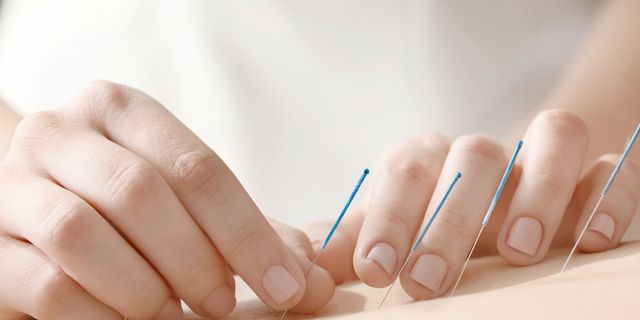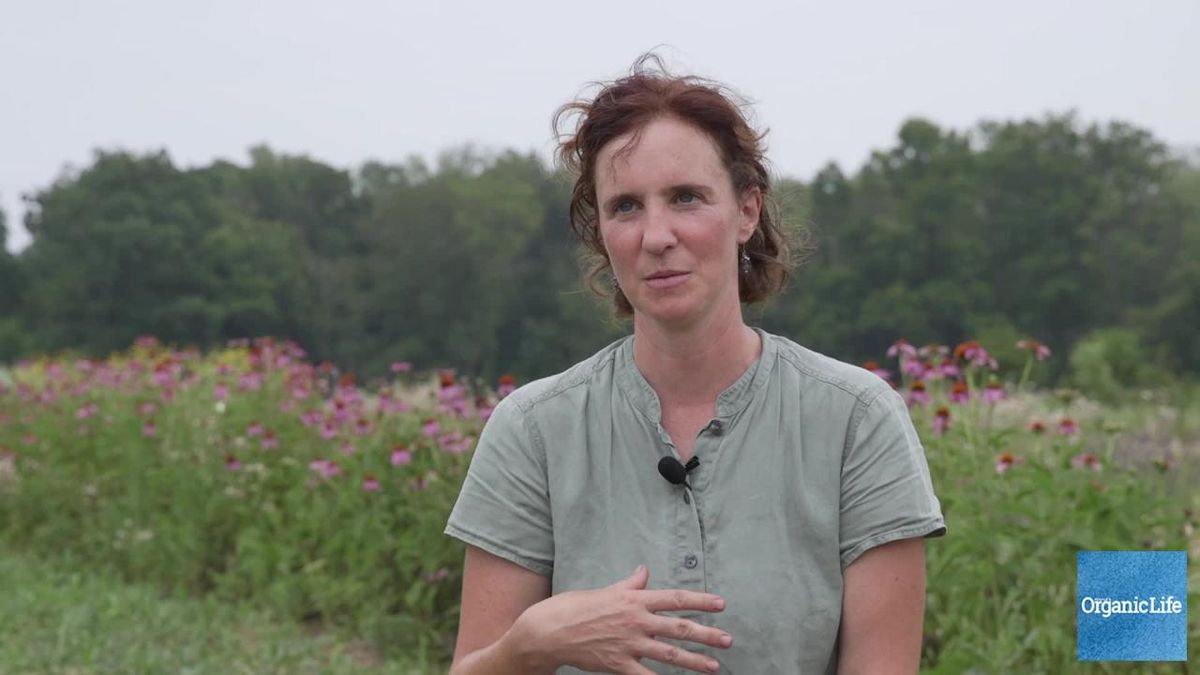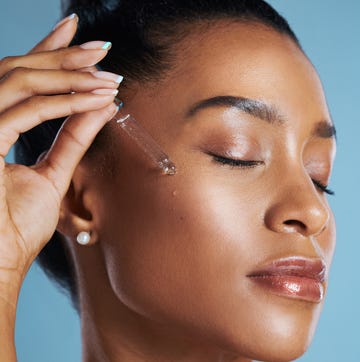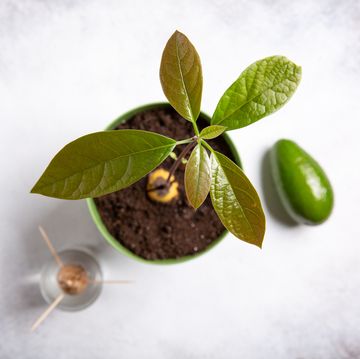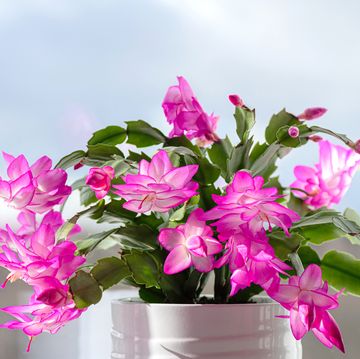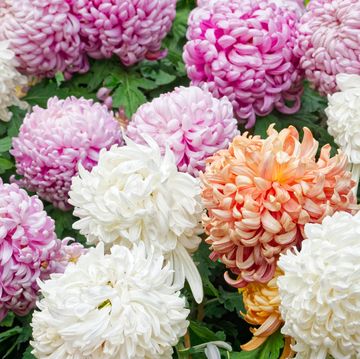Next year, if all goes well, I’ll give birth to a baby. Two months afterward, I’ll turn 42.
I tried acupuncture after a year-plus of conventional fertility treatment, including three rounds of intrauterine insemination (IUI) with Clomid or Gonal-F, and multiple years of trying the old-fashioned way. For me, acupuncture was a last-ditch effort at conceiving a baby. Four months after I started treatment, I was pregnant.
Related: 9 Surprising Things An Acupuncturist Can Help You With
Did acupuncture accomplish what good old-fashioned “trying” and fertility doctors alone could not? There is, of course, no way to know for sure. Real life doesn’t adhere to laboratory test conditions, and just because various medications and interventions didn’t work for me and my husband in the short-term, doesn’t mean that they wouldn’t have been effective eventually.
Further, my experience might not be your experience: I would never want someone to read my story and decide to see an acupuncturist instead of getting evaluated by a reproductive endocrinologist (RE), especially if they’re running out of time on the biological clock.
That said, there is evidence that acupuncture can be an effective tool for couples trying to conceive. I believe I would not have gotten pregnant without acupuncture.
(Like what you're reading? Sign up for our newsletter to get health insights, clever kitchen tricks, gardening secrets, and more—delivered straight to your inbox. And follow along on Facebook and Instagram.)
What It’s Like To Get Acupuncture For Infertility
I found my acupuncturist, Gina Maria Piccirillo, MSTOM, LAc, by searching online for nearby practitioners. (She practices in Tarrytown, NY and New York City.) I had two criteria in mind: 1) I wanted someone with specific experience treating infertility, and 2) I wanted a “community-acupuncture” model, which is where the acupuncturist treats multiple patients at a time, typically for a lower fee. After more than a year of fertility treatments, cost was definitely a consideration.
The intake process at my acupuncturist started similarly to a first visit at a doctor’s office, with paperwork—although some of the questions were different than you might get at your standard GP’s. In addition to asking about chronic conditions and complaints, the forms asked about tolerance for heat and cold, energy levels, emotions, and sex drive. (Here are 7 things an acupuncturist will know about your after just one appointment.)
After the paperwork, I was ushered into a large, bright room full of chaise lounges covered in white sheets. Patients reclined in the chairs, some with just their sleeves and cuffs rolled up, others with their tummies peeking out, depending on where the needles needed to go.
Piccirillo asked me a few more questions, and examined my tongue, top and bottom, and took my pulse. (Find out exactly what acupuncturists see when they peer at your tongue.) Then, she needled me up, inserting needles into various points on my lower legs, elbows, hands, face, and abdomen. She even stuck one needle into the scalp at the very top of my head and a few into my lower abdomen—think right above where an enthusiastic bikini wax would stop.
The actual “getting stuck with pins” part of acupuncture was easy. After three IUIs, multiple painful and invasive tests, and several series of self-administered daily injections, a few tiny needles were nothing.
How Acupuncturists Find—And Fix—Problems
Piccirillo explained to me what acupuncturists look for during this process:
“Our treatments are always root and branch. So, root is the real cause, and the branch is the symptomatology,” she says. “Think of an onion—there is the skin and when you peel away the outer layers, you get to the bulb. The outer layers are the manifestation (the symptoms), but the bulb is the root (the true underlying cause) of the problem.”
Practitioners use pattern differentiation to determine the root cause of the problem. They look at the tongue and feel the pulse, examining three pulses on each side of the body, left and right. Left corresponds to the yin, or female, and is concerned with blood. The right corresponds to the yang, or male, and is concerned with qi (energy). There can be six or seven patterns for every issue, says Piccirillo. In infertility, for example, it could be a stagnation of the blood, deficiency of the blood, or cold in the uterus.
In my case, the root cause was liver qi stagnation, which often manifests as irritability (guilty), anger (yup), or disinterest in sexual relations (not so much, but you could ask my husband how interested he was in having sexual relations with the irritable, angry person who was stomping around our house).
“There’s an emotional component, sort of an angry, unsettled [feeling],” Piccirillo says, comparing it to the expression, “something’s stuck in the craw.” She adds: “Qi that is not stagnant is very important for overall health, mental clarity, and decreased emotional fluctuations.” Because qi helps the blood flow easily, stagnation can lead to delayed periods with clots and pain (dysmenorrhea) or periods that don’t come at all (amenorrhea).
Related: 5 Period Symptoms That Might Signal A Serious Health Problem
I Saw Some Results Pretty Quickly
Over the next few weeks, I started to notice that I felt better—to the point where I was struck by how lousy I must have felt before. I slept better and had more energy. I started letting the little things go. One morning, I woke up and my computer wasn’t working. Instead of freaking out, I calmly researched fixes on my phone and set some updates to install…and then went for a walk.
If you’re not a person with stagnant liver qi, that might not sound like a big deal. But I can tell you that was not my usual way of doing business before.
About three months after I started acupuncture, my husband and I met with a new reproductive endocrinologist. At the appointment, he commented on the fact that my uterine lining was very thick, and recommended that I come back in a week for a pregnancy test.
It was positive. When I told Piccirillo, she whooped with joy.
What To Know Before You Try Acupuncture For Infertility
Although I decided to seek an acupuncturist who specialized in infertility, Piccirillo says that it’s not necessary. Instead, she recommends looking for a practitioner licensed in your state who specializes in pattern differentiation, as described above. Be prepared to invest some time in the process. I went weekly for about four months before getting pregnant, and that’s not an atypical amount of time for fertility patients. When I began, I was told to give it at least a season (meaning three months or so).
The investment of time is another reason fertility patients might want to look for a community acupuncture practice near them, to reduce costs. Three months’ worth of once- or twice-weekly sessions can add up pretty quickly, especially if you’re doing other treatments in addition to acupuncture.
Related: 5 Herbalists Reveal Their Go-To Natural Remedies For Stress, Poor Sleep, And More
Your acupuncturist might use Chinese herbs in your treatment, and might have lots of unexpected food recommendations. Piccirillo, for example, encourages me to eat a lot red foods like red beans, pomegranates, beets, cherries, and red cabbage. Most of all, she stresses that food should be warm for women who are trying to conceive—as in heated up, not as in spicy. “Cold creates stagnation and therefore a decrease in the movement of qi (energy),” says Piccirillo. (Trying to conceive? Eat these 5 foods to up your chances.)
Here's why one nurse thinks we should embrace herbal remedies over Rx prescriptions:
My Acupuncturist Is Great—But I'm Still Glad I Saw Fertility Specialists, Too
The National Infertility Association and most doctors and insurance providers recommend that couples seek the help of a fertility specialist, like an OB/GYN, urologist, or reproductive endocrinologist, after a year of timed, unprotected intercourse that doesn’t result in a pregnancy. (Six months, if the female partner is age 35 or older.)
Related: All The Things You Should Never Say To A Pregnant Woman Who's Struggled With Infertility
In my case, I went to two clinics staffed by reproductive endocrinologists, with very different results. I went to the first, larger clinic for over a year, had three IUIs, and didn’t get pregnant. By the time I saw the second RE, I was already pregnant and didn’t know it—but he was still extremely helpful. For one thing, the office was smaller and care more personalized. Perhaps because of that, he picked up on two things that the other team had missed: a cervix with an opening that was, to quote the good doctor, “tiny, tiny—like a pinhole” and a clotting disorder that might have prevented a pregnancy from sticking. He also recommended a course of progesterone suppositories, to support the early pregnancy, as well as short-term blood thinners to prevent miscarriage from clotting.
I’d encourage anyone who’s trying to get pregnant to consult with both western and eastern medical experts—and not to hesitate to switch doctors or practitioners if they feel they’re not being listened to.
The bottom line is that I’d encourage anyone who’s trying to get pregnant to consult with both western and eastern medical experts—and not to hesitate to switch doctors or practitioners if they feel they’re not being listened to. In my case, I believe that acupuncture helped me get pregnant—despite a cervix that made it highly improbable!—and the combination of eastern and western medicine helped keep me that way.
Your mileage may vary. But it’s your body and your bank account, so don’t be afraid to ask a potential practitioner tough questions…and move on if you don’t like the answers.
